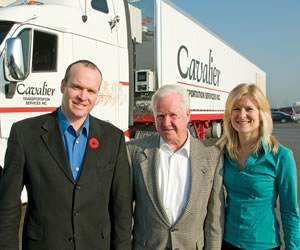Generation to Generation
Passing on the family business can be fraught with emotion and strife. It doesn’t have to be, says Tom Deans.
Family businesses are often born out of love – a place where children get involved for all the right reasons – but remarkably few survive to the second or third generation.
According to local author Tom Deans, many family businesses in the Headwaters region are grappling with the problem of passing on the family business to the next generation. It’s a process that can be fraught with emotion – and it can tear families apart.
Deans, the son of Symplastics founder Bob Deans, had worked in the family business in Orangeville until it was sold in 2007. His grandfather had also founded a business in Orangeville, Carlew Chemicals. From his father and grandfather Deans learned valuable lessons about business planning – and from this experience, as well as discussions with dozens of business owners, Deans has written a book, Every Family’s Business: A Blueprint for Protecting Family Business Wealth, to help other families navigate through this most emotional and complex process.
Written in a breezy, “novel format,” similar to The Wealthy Barber, David Chilton’s phenomenally successful financial planning guide, Deans’ book is a conversation between two men who meet on a trip to Barbados. Coincidentally, both have just sold their family businesses and are looking to invest the proceeds.
William Cartwright, 47, had a happy experience of it, but for 77-year-old John Evason, the process was a nightmare. They compare notes and, as the trip unfolds, they decide to write a book together to help other family business. The resulting “blueprint” consists of a dozen questions families can use to clarify the current state of their business – and its future.
Deans, who is also 47, lives in Hockley Valley. Following is my conversation with him.
How did you come to write this book?
The success rate of businesses moving into the second generation is so low and I was curious about that. There are some very good books on family businesses, but my sense was they weren’t getting read. My larger motivation was to change the way family businesses manage themselves and plan their future. Family businesses are temporary and fragile and owners often don’t see the risks.
What is it about family businesses that blind them to the risks?
It is actually the same qualities that make them great. It is a real paradox. Typically it’s a lack of clarity among family members as to who will own the business. In this region, there are hundreds of business owners working shoulder to shoulder with their kids. The parents think the children will buy the business; the kids think the businesses will end up in their hands as a gift. There is this huge gap in expectations.
For owners grappling with succession planning, what are the main challenges?
There is tremendous guilt that business owners, particularly founders, feel in selling their businesses. Selling is often equated with failure, when in fact selling is the goal; it’s actually the moment that they’ve succeeded. So doing the last deal is always the hardest deal. That sense of guilt is what causes most business owners to push off that whole process of planning their exit.
What about the perspective of the next generation? What is the challenge for them?
What I’m getting at is taking away this idea of gifting the business. It really is the number one destroyer of family relationships and wealth. So, if the child wants to buy, I say there is a buyer in the house. When the child risks their own capital, he’s relieving himself of a burden of legacy. That child is then able to run the business, drive change and innovation, which is critical to every business. When families gift their businesses, children run those businesses like a museum, preserving what they received as a gift.
How much of the wisdom and advice in this book is distilled from your personal experience?
A profound amount. I think in some respects my father’s greatest legacy may in fact be the principles I share in the book that will shape and touch, hopefully, millions of family business around the world.
How has he reacted to this book?
Thrilled. Excited. Moved. All of it.
How is your book different?
Traditional family business books push passing the business to the next generation as the goal. This book says preserving and passing the wealth is the goal, but most importantly passing the values of entrepreneurship and experience about business to the next generation.
Even if it becomes a “museum”?
In fact, we know that of the 100 largest businesses in the year 1900, sixteen were standing by the year 2000. These were the biggest, best capitalized, best managed companies in North America. Now let’s talk about your average small business in Dufferin County. This notion that it can last 100 years? The odds are even more improbable.
What’s the link between your family history and the approach you recommend in your book?
It actually only hit me after we sold our business. On my last day at Symplastics, I was driving out of the parking lot and thinking, isn’t this interesting. I didn’t feel any kind of remorse. I felt quite optimistic that I was merely doing what two other generations before me had done, which was start, run and then sell a business. Knowing when to exit a business is as important as knowing when to invest in one.
What’s been the response to your book? What feedback are you getting?
Amazing. I’ve had business owners, some almost in tears, telling me that they lack a methodology for exiting their business. They invited their children for all the right reasons: because they trusted them, because they loved them, because they wanted to offer them an opportunity. And then over time, the thing that looked like a great idea becomes a thing that is driving the family apart.
Right now what we have in most family businesses is silence. It’s the silence that is the great destroyer of wealth and the great destroyer of families themselves.
Thirty per cent of family businesses pass to the second generation. Only 3 per cent make it to the third generation. If only 3 per cent of businesses founded today end up in the hands of grandchildren, should we not write a book for the 97 per cent of family business owners who will sell, go bankrupt or voluntarily close their doors? Instead of those 97 per cent of all family businesses – of which there are over two million in this country by the way – feeling guilty and feeling like failures, they should feel good.
You’re saying the reader needs to broaden the definition of family business?
Exactly. Even if a business owner does not have kids involved in the business, if he has a health event or dies, typically the shares go to the spouse or the kids. It immediately becomes a family business.
Most owners have no formal transition plan. The book is saying get a plan, even if your kids aren’t involved in the business. Understand how, in the event of death or disability, you’re going to deal with the shares of your business.
But do not gift your shares of an operating business to your children. It is the beginning of the end. You’ll destroy their wealth. They’ll destroy the company. They’ll be laden with guilt and remorse if they destroy the one thing they were ill-suited to perpetuate.
If a family business owner were to sit down with their kids today and say, “Would you be interested in owning this business one day?” and the kids say, “Hell no, I want to be a surgeon. I have no interest in running a shoe company.” Better to know that now. Now you can sit down with an advisor and craft a will that doesn’t have your shares flowing to your children or your spouse. It has them going to a key employee or you have a buy-sell agreement. You put a value on the business and you sell the business in the event of a death.
What doesn’t work is thinking “I’ll die and someone in my family will step into this business and perpetuate my idea and my legacy.”
The kinds of issues you’re dealing with, you could be a psychoanalyst, a therapist for people.
The first thing I tell business families is you’re not alone. In fact, highly functional, open, communicative families are rare. This is a national crisis. The leading edge of the baby boomers were born in 1948. They’re turning sixty this year. And they’re business owners, in record numbers. In many cases, they have no family in the business, fewer children, or children that aren’t interested in the business. They have fewer succession options.
In fact, the questions in the book allow people to be their own therapist. I think where a lot of advisors fail is that they come in with a road map; they come in with the answers. In the case of my book, families go through the questions and say, “This is where we have to go and this is the plan that our family built together.”
For more information, go to www.ThomasWilliamDeans.com.
Related Stories

All in the Family
Nov 18, 2008 | | CommunityFamily businesses are at the heart of the Headwaters economy.






